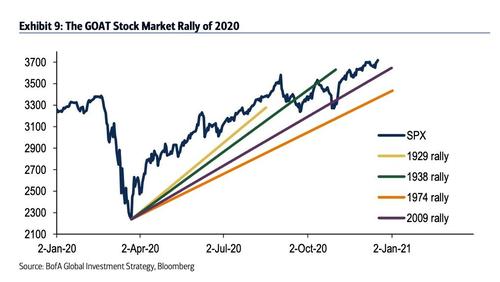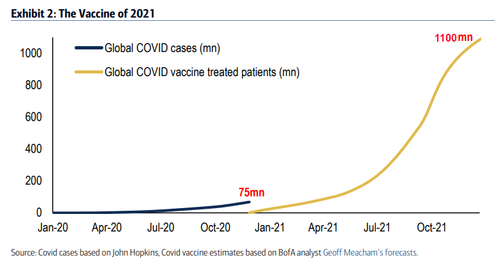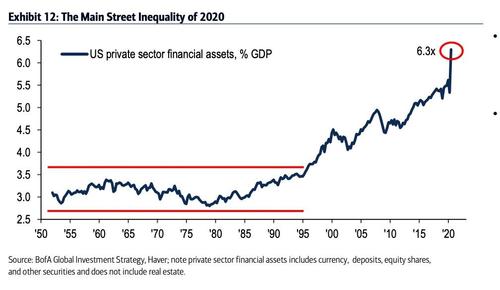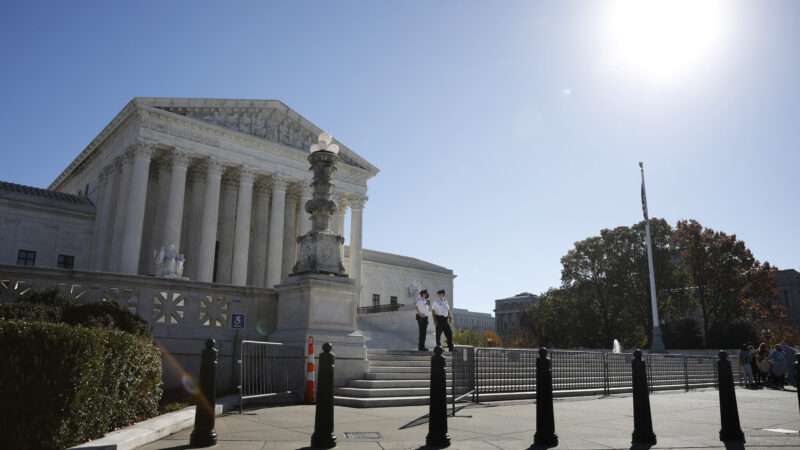Red And Blue States: It’s Time For A Multistate Solution
Authored by James Ketler via The Mises Institute,
Far from being a unitive force, powerful, centralized government only serves to pit blocs of the electorate against each other. Division grows in lockstep with the ceaseless expansion of federal power, and the 2020 presidential election was a mere symptom of how heated that division has become. How much worse can it get? That remains to be seen. After Joe Biden’s contested presidential win, the country may have to break apart into multiple independent political units if it is to avert further social disintegration.
Power and Polarization
To win elections, candidates must pander to the lowest common political denominator; i.e., they must promise to expand wide-reaching projects like social security, public healthcare, economic stimulus, and the military. In fact, candidates are incentivized to outpromise one another and when in power to follow through on carrying out at least some of those promises in the interest of reelection. The mass-democratic structure lubricates this process, as costs are distributed across the entire population and thus become more or less “hidden.” That’s led to a constant, creeping growth in government power, behind which Republicans and Democrats almost always form a united front. As Tom Woods says: “No matter who you vote for, you always wind up getting John McCain.” Within that statist unity, however, exist the seeds of electoral division.
Old, widely accepted government programs are used by politicians as a springboard for new, more expansive powers. Consider, for instance, the Green New Deal; it could only have been seriously proposed because of the broad-based support the New Deal programs have today. Each new law, regulation, bureau, and program is like a brick on top of which many others can be laid. Government seldom abrogates any of its power, tending instead towards constantly expanding it. That raises the stakes higher and higher with each successive election, with the winning party taking office with more power than ever before.
Centrally, as vote seekers, candidates must always work to demonize the opposition and distance themselves from them. To safeguard their own interests, voters must factionalize behind one candidate or the other, often coming to develop a deep, politico-cultural affinity with their choice, though they may only be the “lesser of two evils.” This drives a sharp wedge down the center of the political spectrum, pushing both sides further and further apart. As competing ideologies vie for control of the system, smaller and more amicable politico-cultural disputes thus become the faultlines of national fractionation. Many nuanced opinions are pounded into the ground and replaced, instead, by the Republican-Democrat binary. These two sides look at politics with irreconcilable politico-cultural presuppositions, driving each side—as both fight for control of the same system—to hate the other.
Once one party seizes control of the federal apparatus, it tries to solidify support from independents and moderates, while also working to “punish” its political rivals. From the enlightened, liberal principles that originally drove its adoption in the West, democracy has melted and deformed—as it was always inevitably bound to—into an arena of open-faced realpolitik. Both parties seek to win by any means necessary, and the losers must always “accept the results of the election”—that is, have the will of the majority imposed upon them. It’s a system that neither side can consistently accept and that both—for the good of the people—must agree to reject.
America’s Division Crisis
Nearly eight in ten Republican voters agree that this year’s presidential election was rigged against President Trump through the perpetration of widespread voter fraud. Biden’s “win” was, as they see it, a fait accompli—predetermined before the first vote was cast. The legitimacy of the past few elections have been widely contested, moreover, as with, for instance, the Democrats’ accusations of Russian interference in 2016. After years of investigations and hearings, at least, those accusations were proven false, but this time around, further inquiry into the Republicans’ claims of voter fraud have been blocked by the mainstream media and the Washington establishment. With just cause, therefore, Trump loyalists have grasped at every legal recourse they can find in hopes that something will stick. But the bid to overturn the election was, from its inception, a long shot. On January 20, the 74 million Americans who voted for Trump will be forced under the yoke of a Biden presidency, which will only serve to turn up the heat in the country even more.
Nevertheless, Joe Biden has continuously tried to position himself as a moral leader who will “unite” the nation. In his November 7 victory address, he said, “I will govern as an American president. I’ll work as hard for those who didn’t vote for me as those who did.” Does anyone, though, actually believe that? Biden’s politics have differed over the years, but it’s clear that his 2020 agenda is by far further to the left than that of any other president in American history. At his side is Kamala Harris, who was rated the most progressive senator in all of Congress last year. How can anyone pretend to imagine that the next administration will be at all “unifying”? Better yet, how can anyone think any modern presidency will bring America together? Since 2016, the Democratic Party has freely embraced the tenets of socialism and radical progressive politics, while the rise of Trump helped fuel the growth of a new “America First” nationalist populism in the Republican Party. In just the past four years, the two parties have aggressively shifted away from each other and toward their ideological fringes. Moving forward, that split will likely only widen further.
On the campaign trail, Biden identified himself as a “transition candidate” for a deeper, more radical leftism coming down the line. First, the likes of Kamala Harris will take the reins of the country; then, AOC and “the Squad.” The Constitution-bashing, history-flipping platform of these soon-to-be party leaders will only exacerbate left-right tensions even further as they deal the coup de grâce to America’s founding principles. On the conservative side, Trump insiders have already pointed to the possibility of the outgoing president staging a comeback campaign in 2024. And if he doesn’t run himself, it’ll be one of his children, or his closest allies in Congress—perhaps Tom Cotton or Matt Gaetz. The “Trump brand” looks like it’s here to stay in the Republican Party, and, if it is, it will continue to focus on carrying out the MAGA agenda. In fact, after four years of Biden, the Trump camp may be more energized than ever before. As the national consciousness continues to fork apart all the more diametrically, friends and neighbors will become—in the affairs of state, at least—ever more bitter enemies, and the dream of a “united” US will fall further out of reach.
With that in mind, we must ask: Why should America be a single country at all? The states have for years already been working to nullify federal legislation on guns, drugs, healthcare, immigration, the environment, and police militarization. Why hold the states together in a union whose diktats they each want to escape? That steady resistance is unlikely to do anything but grow. Last month, after one of Biden’s top covid policy advisors called for a national lockdown, more than a dozen Republican governors expressed their refusal to comply. How much more will it take before states decide to just walk away entirely?
Secession would give states full sovereignty over their own affairs, so that voters could live under policies more friendly and suitable to their own local and regional interests. There would no longer be a system of national politics, through which voters control and domineer others hundreds of miles away. From the very earliest years of the republic, secession was considered a viable possibility. The United States was not considered a single, monolithic blob, as it often is today, but rather a voluntary confederation of free and independent states associated for the preservation of the common good. If the political tides turned and the Union ceased to be beneficial to its constituent parts, each was free to leave it. In 1816, Thomas Jefferson made this clear:
“[I]f any state in the union will declare that it prefers separation….I have no hesitation in saying ‘let us separate.’ I would rather the states should withdraw, which are for unlimited commerce & war, and confederate with those alone which are for peace & agriculture.”
Though the public perception of secession has been radically altered since the Civil War, America’s founding principles respect the right of every state to leave the Union. At this point, the states’ reassertion of that right has been long overdue. Secession is now the only way for the millions of tired and fed-up Americans to protect their interests against federal tyranny. Without it, nothing else can prevent the eventual breakdown of the social order, which is looming in the country’s future.
Just this past summer, far-left looters clashed violently with right-wing groups and police in city streets across the nation from Portland to Kenosha. Some of the postelection “Stop the Steal” rallies have themselves led to dangerous confrontations, including stabbings in Washington, DC, and a shooting in Washington State. Indeed, a poll from September revealed that around 20 percent of voters in general would eagerly support the use of violence against their political opponents. Although the pivotal spark may have not yet arrived, the scaffolding for potential civil disaster is already in place. When the last straw breaks, will America spiral into chaos and insurrection, or will cooler heads agree to peaceful separation?
A Secessionist Moment
The idea of secession is, thankfully, neither alien nor farfetched to voters. In fact, widespread calls for secession have already been made in response to recent presidential elections. After Obama’s reelection, the White House’s “We the People” initiative was inundated by petitions from all fifty states to be granted the right of unilateral secession. When Trump was elected, Democrats in Oregon and California organized serious mass secessionist movements that almost led to both states holding referenda on the topic. With each new election, the politico-cultural divide in America grows deeper and a national breakup looks all the more alluring. The impending Biden presidency may be the drop that spills the bucket.
A poll from Hofstra University this past September found that 44 percent of Republican respondents were open to the possibility of seceding if Joe Biden was elected. For millions of Trump voters, self-determination is an essential component to preserving their families, finances, and ways of life. Even Rush Limbaugh—the “king of conservative talk radio”—recently pondered whether, without secession, right-wing ideals can ever truly “win” again. If some Republican-majority states managed to leave the Union, that might mean lower taxes, fewer regulations, the repeal of gun laws, a new gold standard, school choice, abortion bans, and a more free healthcare market across the board. As independent states, they may discover that Trumpian politics doesn’t actually represent them after all and instead forge paths more in line with their own local traditions. At last, political diversity would be allowed to emerge and flourish in these smaller, decentralized states, keeping the government more homegrown and orienting politics more toward the interests of the people.
What’s most promising is that a few recent murmurings of secession have actually come from GOP lawmakers. After the election, Price Wallace, a state congressman from Mississippi, expressed his interest in secession, followed by Congressman Randy Weber, who succeeded Ron Paul for Texas’s fourteenth congressional district seat. Weber’s secessionist endorsement helped generate attention for the Texas Nationalist Movement (or “Texit”), including a sudden spike in the group’s membership registrations. Weeks later, Texas state congressman Kyle Biedermann announced that when the Texas House resumes session in January, he’ll introduce a bill to allow a popular referendum on the question of secession. Seemingly in support of Biedermann’s proposal, the chairman of the Texas Republican Party, Allen West, then commented, “Perhaps law-abiding states should bond together and form a union of states that will abide by the constitution.” Evidently, state legislators are entertaining the notion, many with considerable interest.
America may be on the brink of a “secessionist moment,” and if it is, the time to dismount the surly tiger of big government is now. Like dominoes, the process need only begin with one single state and many more will surely follow. After everything, that’s the only real solution left for America—shaking hands, splitting up, and staying friends from afar, for clearly the country has already split apart in heart, mind, and soul, and at last this internal reality must be reflected in the legal reality.
Tyler Durden
Mon, 12/21/2020 – 18:20
via ZeroHedge News https://ift.tt/38s329s Tyler Durden












